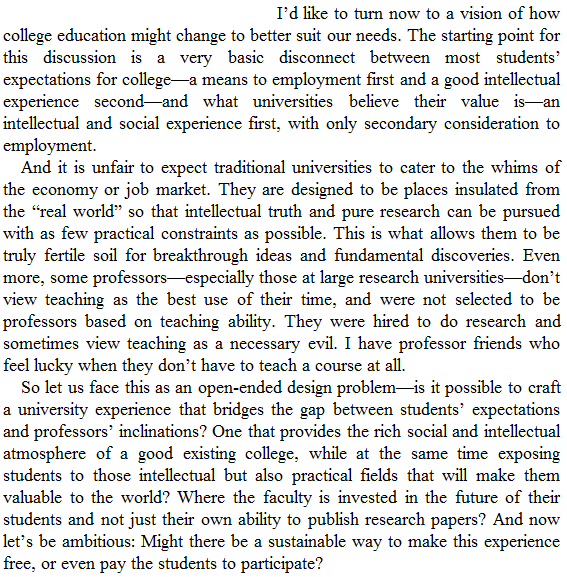|
News & Views item - November 2012 |
![]() National Union of Students Survey Highlights Overcrowded Tutorials, Increasing
Reliance on Group Work, and Insufficient Feedback. (November 14, 2012)
National Union of Students Survey Highlights Overcrowded Tutorials, Increasing
Reliance on Group Work, and Insufficient Feedback. (November 14, 2012)
While the National Union of Students' (NUS) latest survey found that some 65% of those who took part rated their overall experience as either outstanding or good -- 89% rated it average or better -- NUS president Donherra Walmsley told The Australian's Andrew Trounson: "Universities need to revisit what they are doing on campus if they want to stay relevant in an era of MOOCs [massive open online courses]."
The NUS' online survey found that while 54% noted their tutorials contained 20 or more students, only 9% did not get helpful or timely assessment feedback on any of their subjects while over 30% had received such feedback for all their subjects. And "83.5% indicated they would recommend their course to a friend".
Mr Trounson goes on to report: "Ms Walmsley said that while it was possible to improve teaching in large classes it appeared many academics lacked the skills to make them work. As one arts/law student noted in the survey: 'Teachers often substitute class work with group work, which means I cover less of the course and end up learning from my peers rather than a professional'".
All things considered that doesn't sound like too bad a report card but it should also be noted that the NUS report points out: "We predicted overcrowding of classes would worsen. We predicted the casualisation of academia would continue to expand and affect students. We predicted more reliance on online resources at the expense of face-to-face teaching."

And this brings up the book published a couple of months ago The One World Schoolhouse -- with the subtitle Education Reimagined -- by Salman Khan the founder of the Khan Academy which has "the goal of changing education for the better by providing a free world-class education for anyone anywhere".
He titles the penultimate chapter of his book "What College [University] Could be Like" and opens with:

Khan envisions a university which melds university with extended work experience internships similar to that being undertaken at Canada's University of Waterloo as "co-ops" where the creativity of the students is fostered. Will his vision of melding communications technology with the university experience gain traction? With Salman Khan's brilliance and drive I wouldn't bet against it.